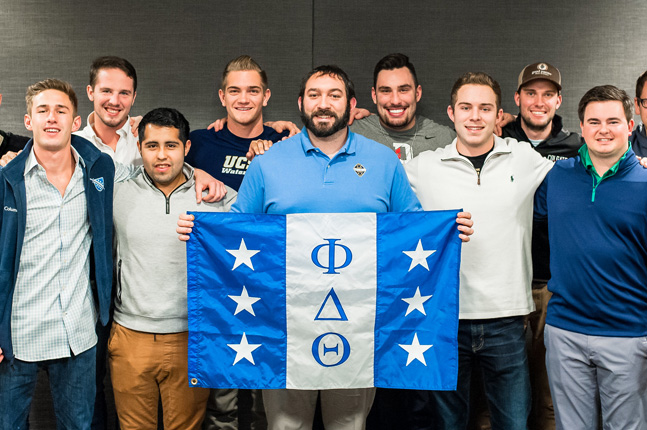By Jordan Pallitto
Many young professionals find themselves struggling to balance new demands amidst pressure to excel quickly in a fresh career. Responsibility to pay student loans. Desire to make the most of a social life suddenly buoyed by the presence of disposable income. Finding new personal and professional networks in an unfamiliar city or industry.
How can a young professional, just out of school and wet behind the ears, deal with this? Many ways, of course. One effective strategy is to get involved in the local community. In college, this meant participating in Make a Difference Day or volunteering at the community center. In professional life, this can and should mean serving on an organization’s Board of Directors – a great benefit to you and your community.
Whether you believe it or not, you learned valuable skills in college that set you apart from your peers and can serve as a springboard for meaningful participation in your new community. If you are entering a new career directly from undergraduate studies, you are part of only one-third of the United States with a bachelor’s degree. If you completed graduate studies, you are among less than eight percent of the population. If you have a doctoral degree, you are part of an exclusive club measuring less than three percent of the over-25 population (according to the U.S. Census Bureau, 2011).
You can leverage these special skills to benefit you and your locale. You may be thinking, “Why would an organization want me?” The answer is “Why wouldn’t they?” According to the National Center for Charitable Statistics, there are nearly 1 million registered nonprofit organizations in the United States, all of which are legally required to maintain a Board of Directors, many of which choose to frequently rotate or turnover board positions to attract new and fresh ideas – like those you can bring to the table. In Allegheny County (Pittsburgh), Pennsylvania, for example, there are more than 4,000 registered nonprofit organizations. In Butler County (Oxford), Ohio, there are more than 1,700. Even in Loving County, Texas – the least populated county in America – there is a registered nonprofit organization. Every one of them faces an uphill battle for new donors, greater impact, and greater relevance – all challenges which you, as a young professional, are equipped to help address.
Additionally, doing so will enable you to (1) grow your personal and professional networks with people who share the same passion for a particular organization or issue, (2) hone your financial literacy skills as you provide fiduciary oversight of an organization’s budget, (3) refine your supervisory skills as you work with an agency’s senior staff to fulfill a nonprofit mission, (4) develop your meeting facilitation skills while you attend, participate in, and potentially preside over board and committee meetings, (5) showcase your particular life experience and expertise as you work on important organizational issues, (6) demonstrate commitment and follow-through to others, (7) learn how to motivate others toward a mission without compensation, and so much more.
Here are a few tips to get started:
- Double check with your employer to see if any company policy prohibits participation on nonprofit boards of directors. This is not common, but it can happen.
- Develop a monthly schedule to understand the time you have available for board service. Be mindful that many boards meet in evenings or on weekends at least once per quarter.
- Read up on general nonprofit fiduciary responsibility and organization management principles, rules, and regulations. Your state’s association of nonprofit organizations is a good place to start. Many online resources such as BoardSource, GuideStar, and others can provide great information for a budding civic leader.
- Investigate your local nonprofit community using online resources like GuideStar or the National Center for Charitable Statistics.
- Create a list of issues, ideas, or organizations for which you have passion, and match those to organizations in your region by using nonprofit NTEE codes (classification codes for nonprofit organizations by focus area such as arts and culture, environment, animals, and many more.
- Visit websites, review publicly-available tax filings, and do other homework on local organizations that match your interest, and create a short-list of those that you like best.
- Reach out to the Executive Director or a board member at each organization to learn more about the process of board recruitment and selection. Have a resume ready, and be prepared to discuss how your skills can help them achieve their mission.
- Recognize that many boards only recruit and select new members once per year. You may have to wait.
Increasing your civic leadership and community engagement while you are struggling to balance new demands associated with post-college life might seem counterintuitive, but it can be an effective strategy for personal and professional growth. You have fresh ideas, up-to-date academic knowledge, and a young person’s drive and ambition to offer. In return, you get a sense of accomplishment from active participation in improving your community while building a strong base of friends and colleagues in an environment that offers learning and development that can’t be matched in an entry-level occupation. In short, you get personal and professional advancement by doing good in your community.
Jordan Pallitto, a consultant with The Hill Group, specializes in strategic planning and organizational capacity assessment. He is a Pennsylvania Association of Nonprofit Organizations (PANO) Standards for Excellence Trained and Approved Consultant. Prior to joining The Hill Group, Jordan worked extensively with Pittsburgh Public Schools to help develop a comprehensive plan for the new Pittsburgh 6-12 Science and Technology Academy. He currently serves on the Board of Directors of the Community Foundation of Westmoreland County (now part of the Pittsburgh Foundation), as Vice President of the Pittsburgh Urban Magnet Project, and is an active volunteer with the Phi Delta Theta fraternity. He is a graduate of Leadership Development Initiative XV, a program of Leadership Pittsburgh, Inc. Jordan earned a Bachelor of Arts degree from Allegheny College and a Master of Science degree from the Heinz College at Carnegie Mellon University.





